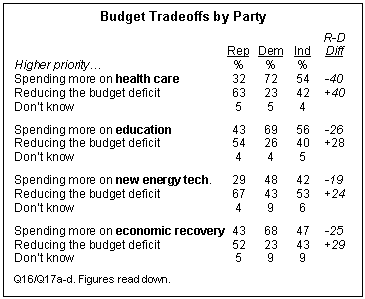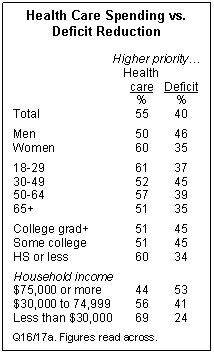
Despite President Obama’s falling ratings for dealing with the budget deficit, it is not clear that the public’s deficit concerns are uniformly resolute. When asked to think about budget tradeoffs, most Americans continue to place a higher priority on increased federal spending for health care, education and economic recovery than on reducing the budget deficit. For example, on the critical issue of health care, 55% say spending more to make health care accessible and affordable should be a higher priority, while 40% prioritize deficit reduction. These findings are largely unchanged from a 59% to 35% margin on this question in April.
Similarly, more favor increased spending to improve education over deficit reduction by a 57% to 38% margin, also virtually unchanged from three months ago. And on the broad issue of spending more to help the economy recover, just more than half (53%) prioritize stimulus spending, while 38% put a higher priority on cutting the deficit.

The one issue tested that has slipped as a priority is increased spending on new energy technology. The number prioritizing this over deficit reduction has fallen from 49% in April to 41% today, with a majority (52%) now rating deficit reduction as the higher priority.
The biggest partisan difference – 40 points – is over health care. Nearly three-quarters (72%) of Democrats see spending more on health care as the priority, while 23% place a higher priority on deficit reduction. By contrast, 63% of Republicans put deficit reduction ahead of increased health care spending, while 32% favor such spending over trimming the deficit. Just over half (54%) of independents place a higher priority on health care spending while 42% say deficit reduction is more important.
Partisan views are similar, though less polarized, when it comes to education. Most Democrats (69%) and independents (56%) see increased spending on education as more important than deficit reduction, while most Republicans (54%) disagree. Democrats stand apart from both Republicans and independents in saying that stimulus spending is a higher priority than deficit reduction. By a 68% to 23% margin Democrats see spending to help the economy recover as more important than reducing the deficit. By contrast, independents are split about evenly (47% place a higher priority on economic stimulus, 43% on deficit reduction), and a slim majority (52%) of Republicans see deficit reduction as the bigger priority.
No partisan group prioritizes spending on new energy technology over deficit reduction. Democrats are now divided (48% spending, 43% deficit). In April 58% of Democrats saw energy spending as more important. The share of independents placing a higher priority on new energy spending also fell from 49% to 42% since April. Republican views have been more stable – currently 67% say deficit reduction should take priority over spending on new energy technology, virtually unchanged from April.

In addition to the partisan differences, opinion also varies by income and age. Those with lower incomes are more likely to support increased spending on health care than those with higher incomes. Nearly seven-in-ten (69%) with family incomes less than $30,000 prioritize increased spending on health care compared with 44% of those earning $75,000 or more. There is a similar pattern when it comes to prioritizing spending on education and economic stimulus over deficit reduction.
Younger people are more likely to favor spending in all four areas (health care, education, energy and economic stimulus) over deficit reduction than older people. The difference is largest for education. Currently 69% of those under 30 prioritize spending to improve education while just 27% say reducing the deficit should be the priority. By comparison, 46% of those 65 and older say spending on education is more important, while nearly as many (45%) say the same about deficit reduction.




